Health Care Law and Ethics: Vaccine Compensation in India
VerifiedAdded on 2020/03/23
|26
|7426
|114
Report
AI Summary
This research paper investigates the critical need for a compensation policy in India to address adverse outcomes following immunization. It explores the ethical and legal dimensions of vaccine-related injuries, emphasizing the importance of fairness and justice in providing compensation. The paper delves into the nature of vaccines, their impact within the Indian context, and the existing compensation frameworks. It analyzes the challenges in implementing these frameworks, highlighting the complexities in establishing causal relationships between vaccines and adverse events. The report advocates for a 'no-fault compensation' approach, arguing for compensation regardless of proven causality, and recommends measures for implementing such policies in India, considering human rights and ethical principles. The paper also discusses the government's role in vaccine procurement, supply, and administration, while addressing gaps in the implementation of immunization programs and the ethical considerations surrounding vaccine promotion. The study concludes by emphasizing the significance of robust AEFI surveillance systems to determine causality and ensure fair compensation for vaccine-related injuries.
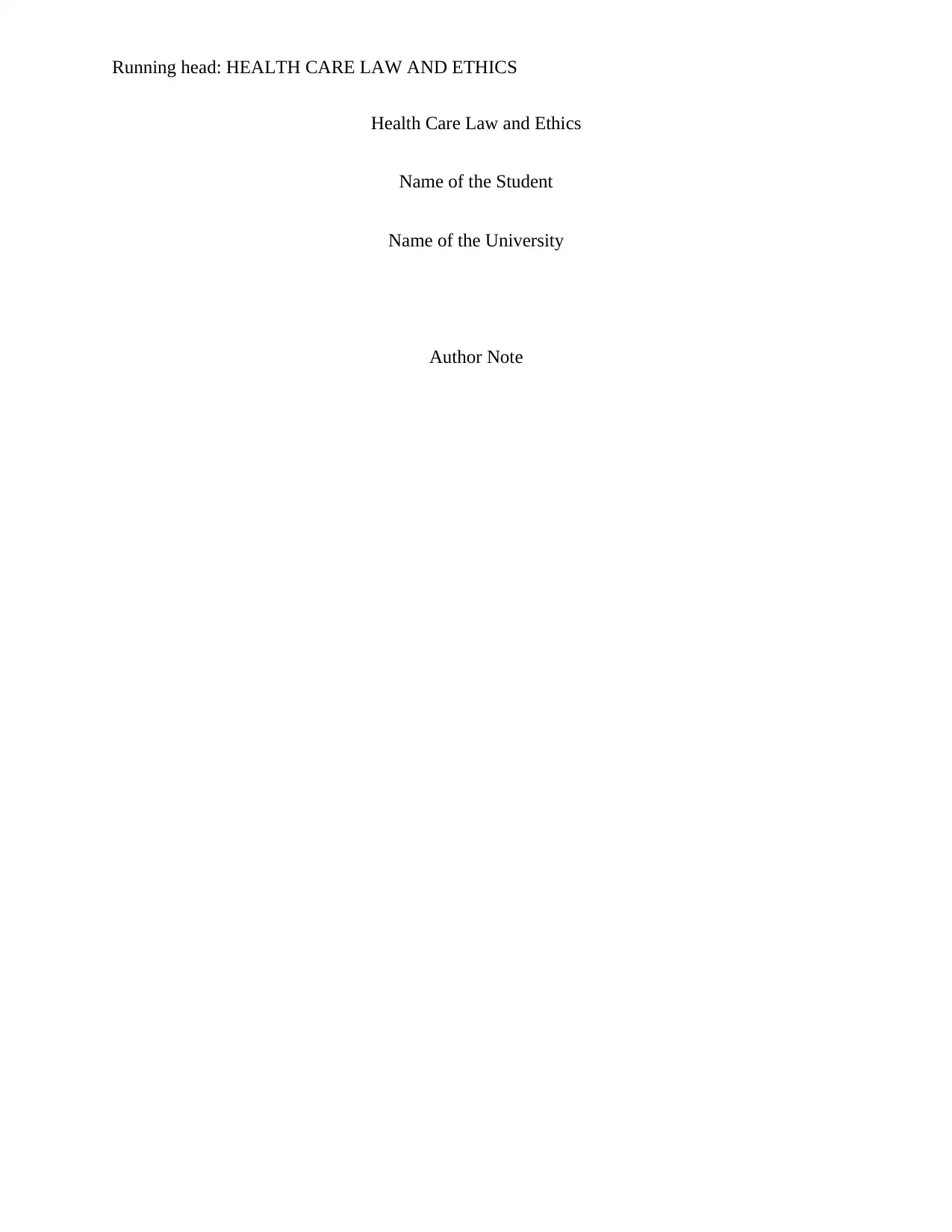
Running head: HEALTH CARE LAW AND ETHICS
Health Care Law and Ethics
Name of the Student
Name of the University
Author Note
Health Care Law and Ethics
Name of the Student
Name of the University
Author Note
Paraphrase This Document
Need a fresh take? Get an instant paraphrase of this document with our AI Paraphraser
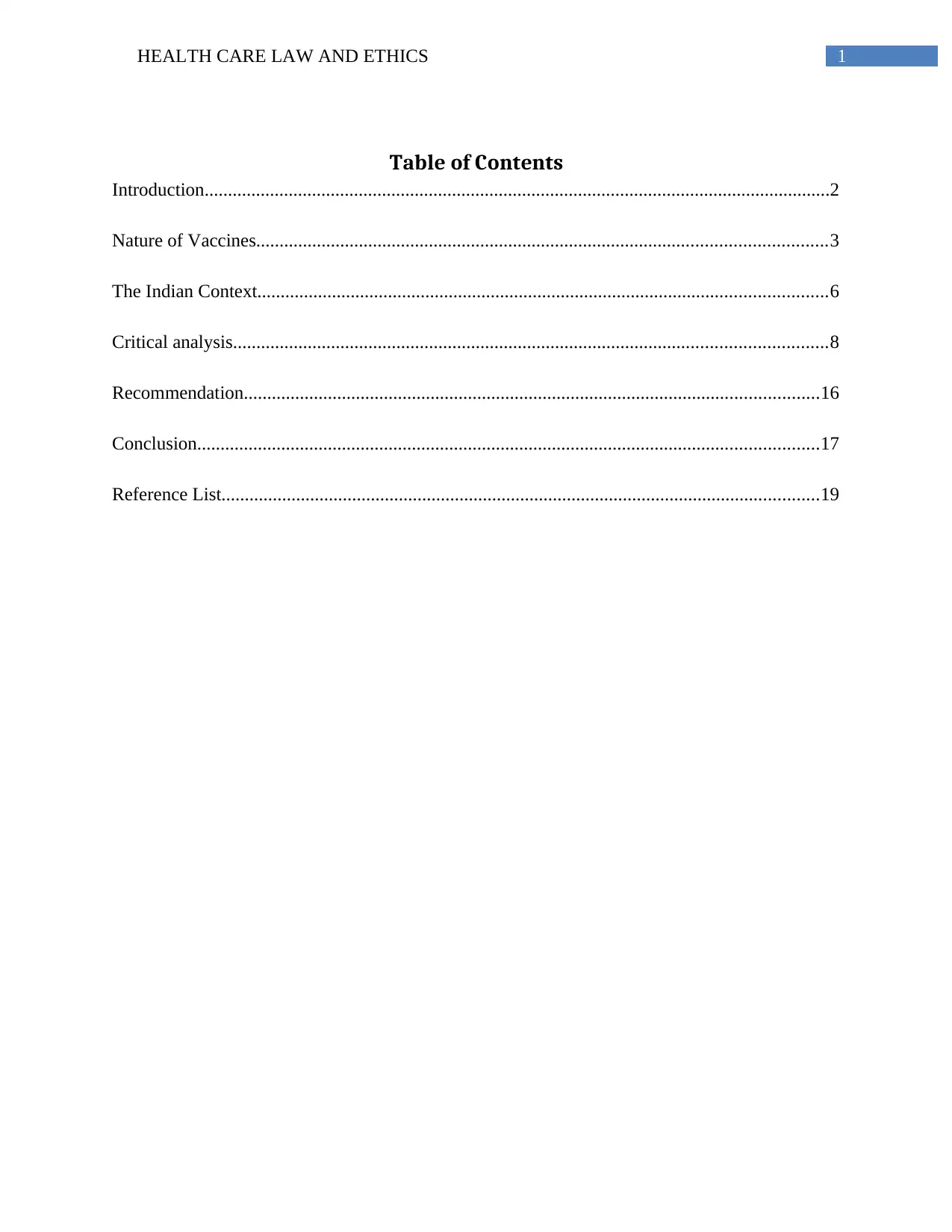
1HEALTH CARE LAW AND ETHICS
Table of Contents
Introduction......................................................................................................................................2
Nature of Vaccines..........................................................................................................................3
The Indian Context..........................................................................................................................6
Critical analysis...............................................................................................................................8
Recommendation...........................................................................................................................16
Conclusion.....................................................................................................................................17
Reference List................................................................................................................................19
Table of Contents
Introduction......................................................................................................................................2
Nature of Vaccines..........................................................................................................................3
The Indian Context..........................................................................................................................6
Critical analysis...............................................................................................................................8
Recommendation...........................................................................................................................16
Conclusion.....................................................................................................................................17
Reference List................................................................................................................................19
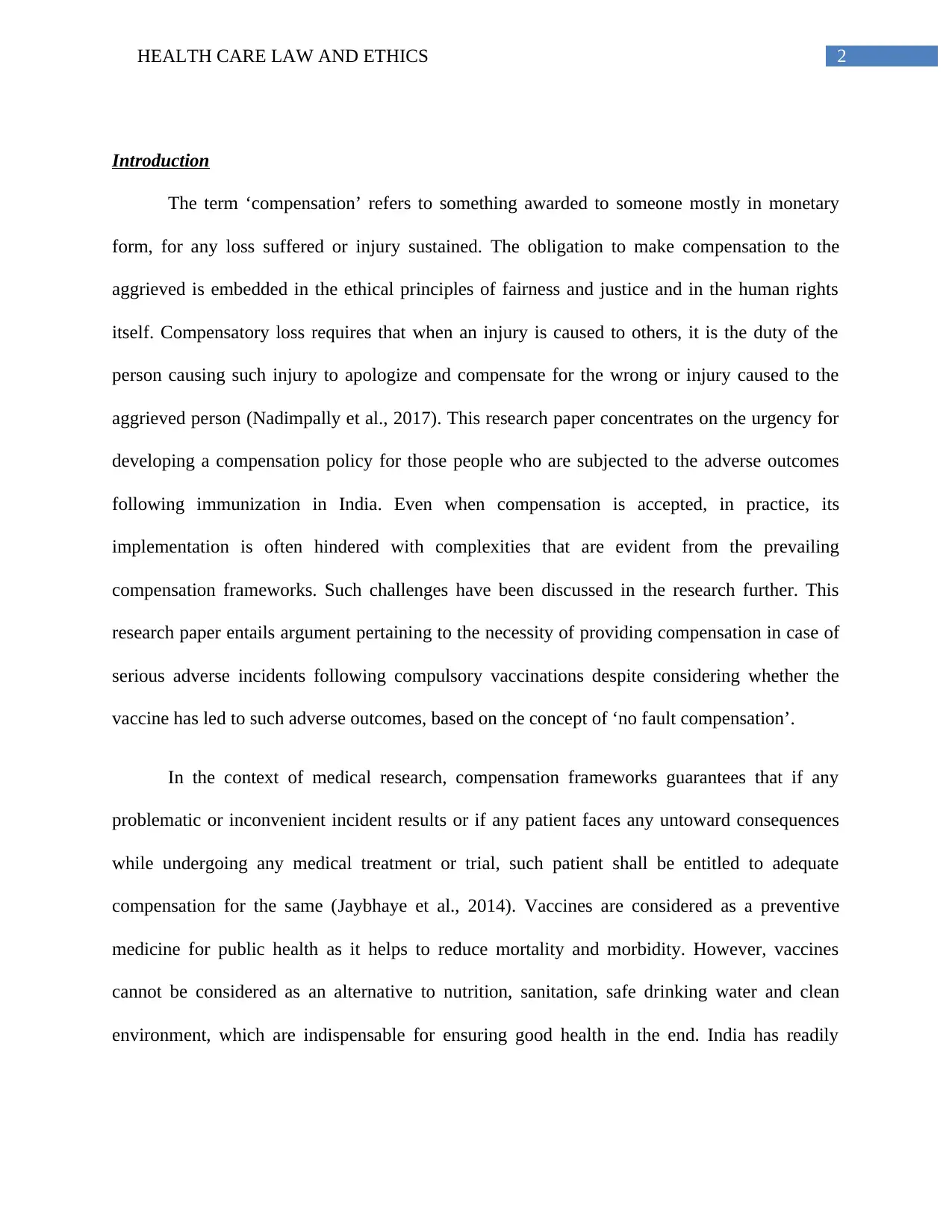
2HEALTH CARE LAW AND ETHICS
Introduction
The term ‘compensation’ refers to something awarded to someone mostly in monetary
form, for any loss suffered or injury sustained. The obligation to make compensation to the
aggrieved is embedded in the ethical principles of fairness and justice and in the human rights
itself. Compensatory loss requires that when an injury is caused to others, it is the duty of the
person causing such injury to apologize and compensate for the wrong or injury caused to the
aggrieved person (Nadimpally et al., 2017). This research paper concentrates on the urgency for
developing a compensation policy for those people who are subjected to the adverse outcomes
following immunization in India. Even when compensation is accepted, in practice, its
implementation is often hindered with complexities that are evident from the prevailing
compensation frameworks. Such challenges have been discussed in the research further. This
research paper entails argument pertaining to the necessity of providing compensation in case of
serious adverse incidents following compulsory vaccinations despite considering whether the
vaccine has led to such adverse outcomes, based on the concept of ‘no fault compensation’.
In the context of medical research, compensation frameworks guarantees that if any
problematic or inconvenient incident results or if any patient faces any untoward consequences
while undergoing any medical treatment or trial, such patient shall be entitled to adequate
compensation for the same (Jaybhaye et al., 2014). Vaccines are considered as a preventive
medicine for public health as it helps to reduce mortality and morbidity. However, vaccines
cannot be considered as an alternative to nutrition, sanitation, safe drinking water and clean
environment, which are indispensable for ensuring good health in the end. India has readily
Introduction
The term ‘compensation’ refers to something awarded to someone mostly in monetary
form, for any loss suffered or injury sustained. The obligation to make compensation to the
aggrieved is embedded in the ethical principles of fairness and justice and in the human rights
itself. Compensatory loss requires that when an injury is caused to others, it is the duty of the
person causing such injury to apologize and compensate for the wrong or injury caused to the
aggrieved person (Nadimpally et al., 2017). This research paper concentrates on the urgency for
developing a compensation policy for those people who are subjected to the adverse outcomes
following immunization in India. Even when compensation is accepted, in practice, its
implementation is often hindered with complexities that are evident from the prevailing
compensation frameworks. Such challenges have been discussed in the research further. This
research paper entails argument pertaining to the necessity of providing compensation in case of
serious adverse incidents following compulsory vaccinations despite considering whether the
vaccine has led to such adverse outcomes, based on the concept of ‘no fault compensation’.
In the context of medical research, compensation frameworks guarantees that if any
problematic or inconvenient incident results or if any patient faces any untoward consequences
while undergoing any medical treatment or trial, such patient shall be entitled to adequate
compensation for the same (Jaybhaye et al., 2014). Vaccines are considered as a preventive
medicine for public health as it helps to reduce mortality and morbidity. However, vaccines
cannot be considered as an alternative to nutrition, sanitation, safe drinking water and clean
environment, which are indispensable for ensuring good health in the end. India has readily
⊘ This is a preview!⊘
Do you want full access?
Subscribe today to unlock all pages.

Trusted by 1+ million students worldwide
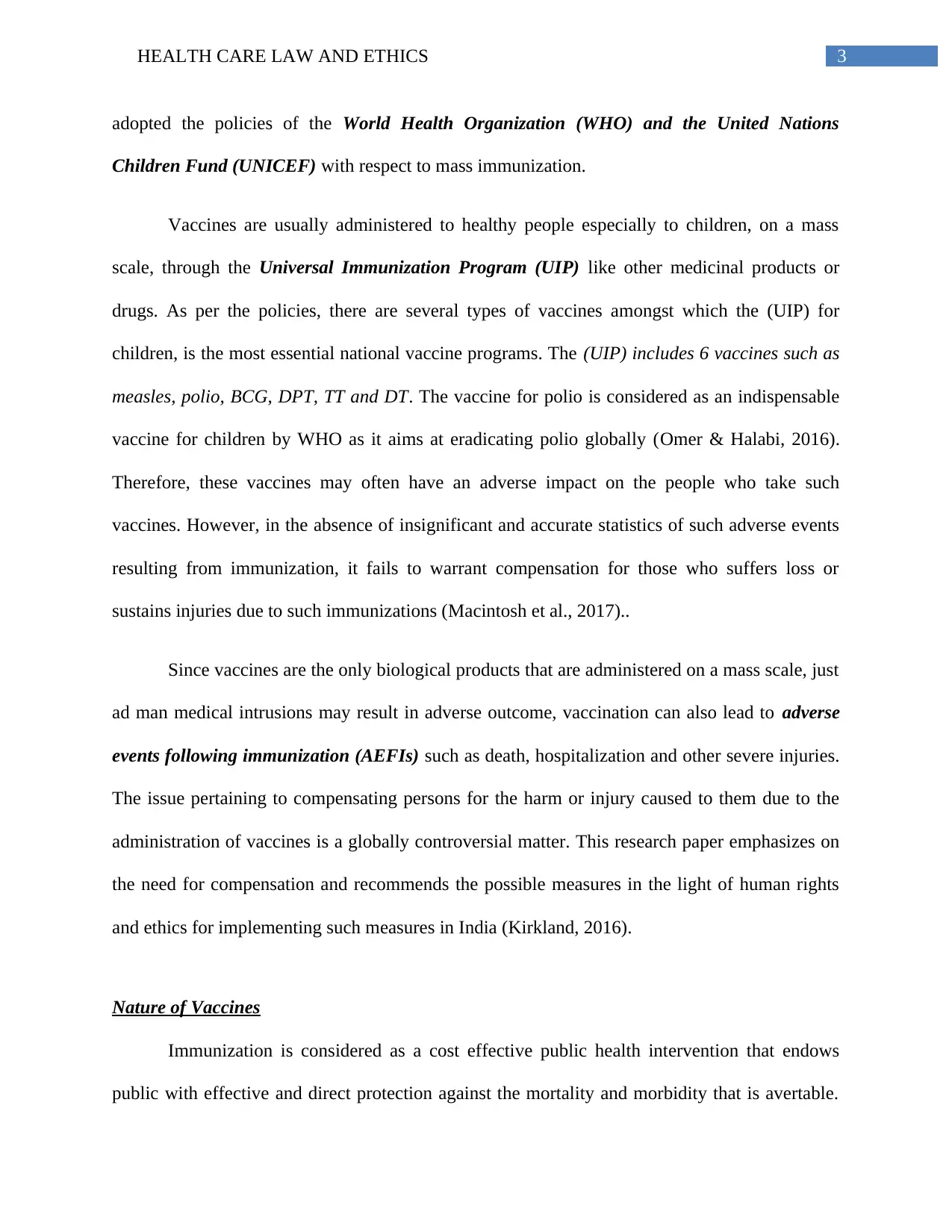
3HEALTH CARE LAW AND ETHICS
adopted the policies of the World Health Organization (WHO) and the United Nations
Children Fund (UNICEF) with respect to mass immunization.
Vaccines are usually administered to healthy people especially to children, on a mass
scale, through the Universal Immunization Program (UIP) like other medicinal products or
drugs. As per the policies, there are several types of vaccines amongst which the (UIP) for
children, is the most essential national vaccine programs. The (UIP) includes 6 vaccines such as
measles, polio, BCG, DPT, TT and DT. The vaccine for polio is considered as an indispensable
vaccine for children by WHO as it aims at eradicating polio globally (Omer & Halabi, 2016).
Therefore, these vaccines may often have an adverse impact on the people who take such
vaccines. However, in the absence of insignificant and accurate statistics of such adverse events
resulting from immunization, it fails to warrant compensation for those who suffers loss or
sustains injuries due to such immunizations (Macintosh et al., 2017)..
Since vaccines are the only biological products that are administered on a mass scale, just
ad man medical intrusions may result in adverse outcome, vaccination can also lead to adverse
events following immunization (AEFIs) such as death, hospitalization and other severe injuries.
The issue pertaining to compensating persons for the harm or injury caused to them due to the
administration of vaccines is a globally controversial matter. This research paper emphasizes on
the need for compensation and recommends the possible measures in the light of human rights
and ethics for implementing such measures in India (Kirkland, 2016).
Nature of Vaccines
Immunization is considered as a cost effective public health intervention that endows
public with effective and direct protection against the mortality and morbidity that is avertable.
adopted the policies of the World Health Organization (WHO) and the United Nations
Children Fund (UNICEF) with respect to mass immunization.
Vaccines are usually administered to healthy people especially to children, on a mass
scale, through the Universal Immunization Program (UIP) like other medicinal products or
drugs. As per the policies, there are several types of vaccines amongst which the (UIP) for
children, is the most essential national vaccine programs. The (UIP) includes 6 vaccines such as
measles, polio, BCG, DPT, TT and DT. The vaccine for polio is considered as an indispensable
vaccine for children by WHO as it aims at eradicating polio globally (Omer & Halabi, 2016).
Therefore, these vaccines may often have an adverse impact on the people who take such
vaccines. However, in the absence of insignificant and accurate statistics of such adverse events
resulting from immunization, it fails to warrant compensation for those who suffers loss or
sustains injuries due to such immunizations (Macintosh et al., 2017)..
Since vaccines are the only biological products that are administered on a mass scale, just
ad man medical intrusions may result in adverse outcome, vaccination can also lead to adverse
events following immunization (AEFIs) such as death, hospitalization and other severe injuries.
The issue pertaining to compensating persons for the harm or injury caused to them due to the
administration of vaccines is a globally controversial matter. This research paper emphasizes on
the need for compensation and recommends the possible measures in the light of human rights
and ethics for implementing such measures in India (Kirkland, 2016).
Nature of Vaccines
Immunization is considered as a cost effective public health intervention that endows
public with effective and direct protection against the mortality and morbidity that is avertable.
Paraphrase This Document
Need a fresh take? Get an instant paraphrase of this document with our AI Paraphraser
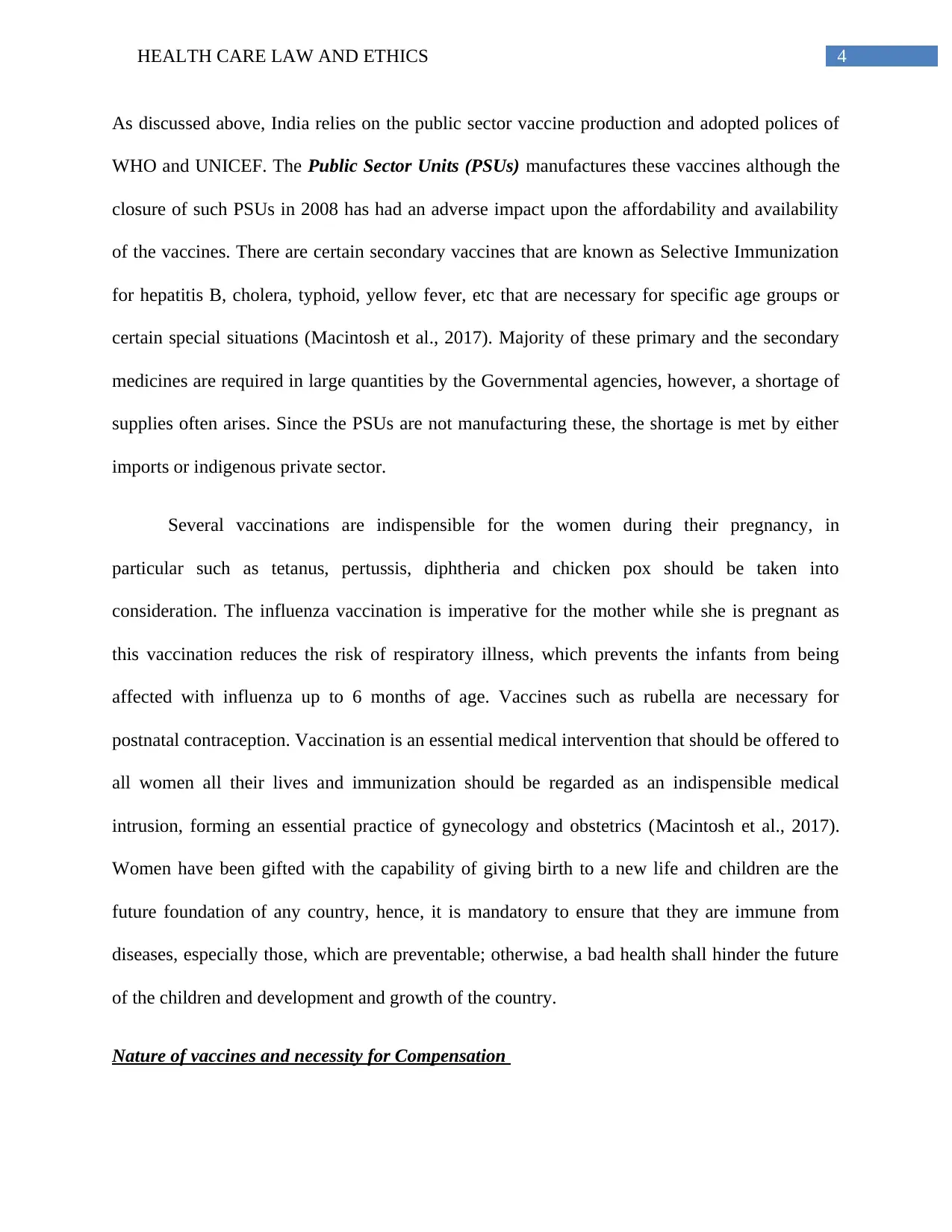
4HEALTH CARE LAW AND ETHICS
As discussed above, India relies on the public sector vaccine production and adopted polices of
WHO and UNICEF. The Public Sector Units (PSUs) manufactures these vaccines although the
closure of such PSUs in 2008 has had an adverse impact upon the affordability and availability
of the vaccines. There are certain secondary vaccines that are known as Selective Immunization
for hepatitis B, cholera, typhoid, yellow fever, etc that are necessary for specific age groups or
certain special situations (Macintosh et al., 2017). Majority of these primary and the secondary
medicines are required in large quantities by the Governmental agencies, however, a shortage of
supplies often arises. Since the PSUs are not manufacturing these, the shortage is met by either
imports or indigenous private sector.
Several vaccinations are indispensible for the women during their pregnancy, in
particular such as tetanus, pertussis, diphtheria and chicken pox should be taken into
consideration. The influenza vaccination is imperative for the mother while she is pregnant as
this vaccination reduces the risk of respiratory illness, which prevents the infants from being
affected with influenza up to 6 months of age. Vaccines such as rubella are necessary for
postnatal contraception. Vaccination is an essential medical intervention that should be offered to
all women all their lives and immunization should be regarded as an indispensible medical
intrusion, forming an essential practice of gynecology and obstetrics (Macintosh et al., 2017).
Women have been gifted with the capability of giving birth to a new life and children are the
future foundation of any country, hence, it is mandatory to ensure that they are immune from
diseases, especially those, which are preventable; otherwise, a bad health shall hinder the future
of the children and development and growth of the country.
Nature of vaccines and necessity for Compensation
As discussed above, India relies on the public sector vaccine production and adopted polices of
WHO and UNICEF. The Public Sector Units (PSUs) manufactures these vaccines although the
closure of such PSUs in 2008 has had an adverse impact upon the affordability and availability
of the vaccines. There are certain secondary vaccines that are known as Selective Immunization
for hepatitis B, cholera, typhoid, yellow fever, etc that are necessary for specific age groups or
certain special situations (Macintosh et al., 2017). Majority of these primary and the secondary
medicines are required in large quantities by the Governmental agencies, however, a shortage of
supplies often arises. Since the PSUs are not manufacturing these, the shortage is met by either
imports or indigenous private sector.
Several vaccinations are indispensible for the women during their pregnancy, in
particular such as tetanus, pertussis, diphtheria and chicken pox should be taken into
consideration. The influenza vaccination is imperative for the mother while she is pregnant as
this vaccination reduces the risk of respiratory illness, which prevents the infants from being
affected with influenza up to 6 months of age. Vaccines such as rubella are necessary for
postnatal contraception. Vaccination is an essential medical intervention that should be offered to
all women all their lives and immunization should be regarded as an indispensible medical
intrusion, forming an essential practice of gynecology and obstetrics (Macintosh et al., 2017).
Women have been gifted with the capability of giving birth to a new life and children are the
future foundation of any country, hence, it is mandatory to ensure that they are immune from
diseases, especially those, which are preventable; otherwise, a bad health shall hinder the future
of the children and development and growth of the country.
Nature of vaccines and necessity for Compensation
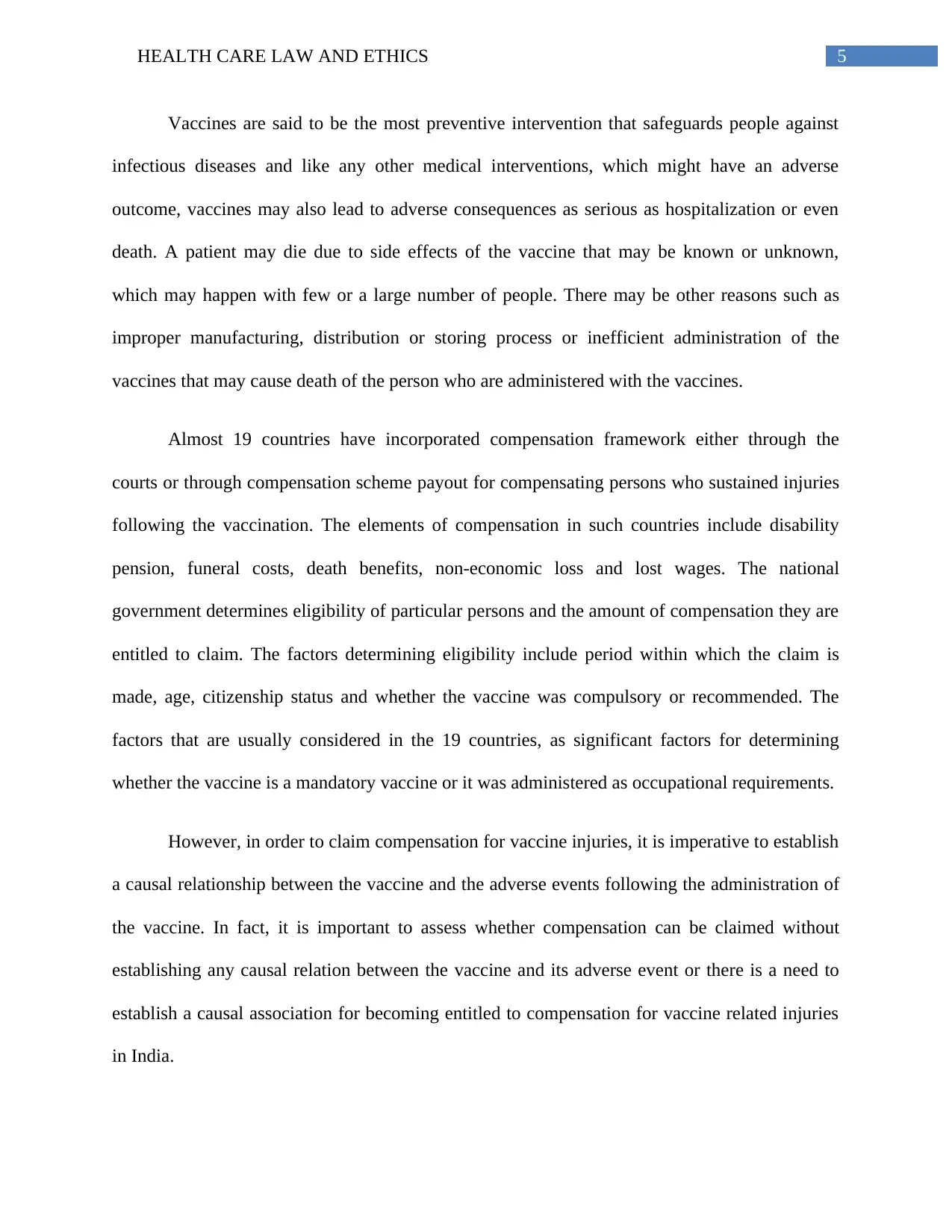
5HEALTH CARE LAW AND ETHICS
Vaccines are said to be the most preventive intervention that safeguards people against
infectious diseases and like any other medical interventions, which might have an adverse
outcome, vaccines may also lead to adverse consequences as serious as hospitalization or even
death. A patient may die due to side effects of the vaccine that may be known or unknown,
which may happen with few or a large number of people. There may be other reasons such as
improper manufacturing, distribution or storing process or inefficient administration of the
vaccines that may cause death of the person who are administered with the vaccines.
Almost 19 countries have incorporated compensation framework either through the
courts or through compensation scheme payout for compensating persons who sustained injuries
following the vaccination. The elements of compensation in such countries include disability
pension, funeral costs, death benefits, non-economic loss and lost wages. The national
government determines eligibility of particular persons and the amount of compensation they are
entitled to claim. The factors determining eligibility include period within which the claim is
made, age, citizenship status and whether the vaccine was compulsory or recommended. The
factors that are usually considered in the 19 countries, as significant factors for determining
whether the vaccine is a mandatory vaccine or it was administered as occupational requirements.
However, in order to claim compensation for vaccine injuries, it is imperative to establish
a causal relationship between the vaccine and the adverse events following the administration of
the vaccine. In fact, it is important to assess whether compensation can be claimed without
establishing any causal relation between the vaccine and its adverse event or there is a need to
establish a causal association for becoming entitled to compensation for vaccine related injuries
in India.
Vaccines are said to be the most preventive intervention that safeguards people against
infectious diseases and like any other medical interventions, which might have an adverse
outcome, vaccines may also lead to adverse consequences as serious as hospitalization or even
death. A patient may die due to side effects of the vaccine that may be known or unknown,
which may happen with few or a large number of people. There may be other reasons such as
improper manufacturing, distribution or storing process or inefficient administration of the
vaccines that may cause death of the person who are administered with the vaccines.
Almost 19 countries have incorporated compensation framework either through the
courts or through compensation scheme payout for compensating persons who sustained injuries
following the vaccination. The elements of compensation in such countries include disability
pension, funeral costs, death benefits, non-economic loss and lost wages. The national
government determines eligibility of particular persons and the amount of compensation they are
entitled to claim. The factors determining eligibility include period within which the claim is
made, age, citizenship status and whether the vaccine was compulsory or recommended. The
factors that are usually considered in the 19 countries, as significant factors for determining
whether the vaccine is a mandatory vaccine or it was administered as occupational requirements.
However, in order to claim compensation for vaccine injuries, it is imperative to establish
a causal relationship between the vaccine and the adverse events following the administration of
the vaccine. In fact, it is important to assess whether compensation can be claimed without
establishing any causal relation between the vaccine and its adverse event or there is a need to
establish a causal association for becoming entitled to compensation for vaccine related injuries
in India.
⊘ This is a preview!⊘
Do you want full access?
Subscribe today to unlock all pages.

Trusted by 1+ million students worldwide
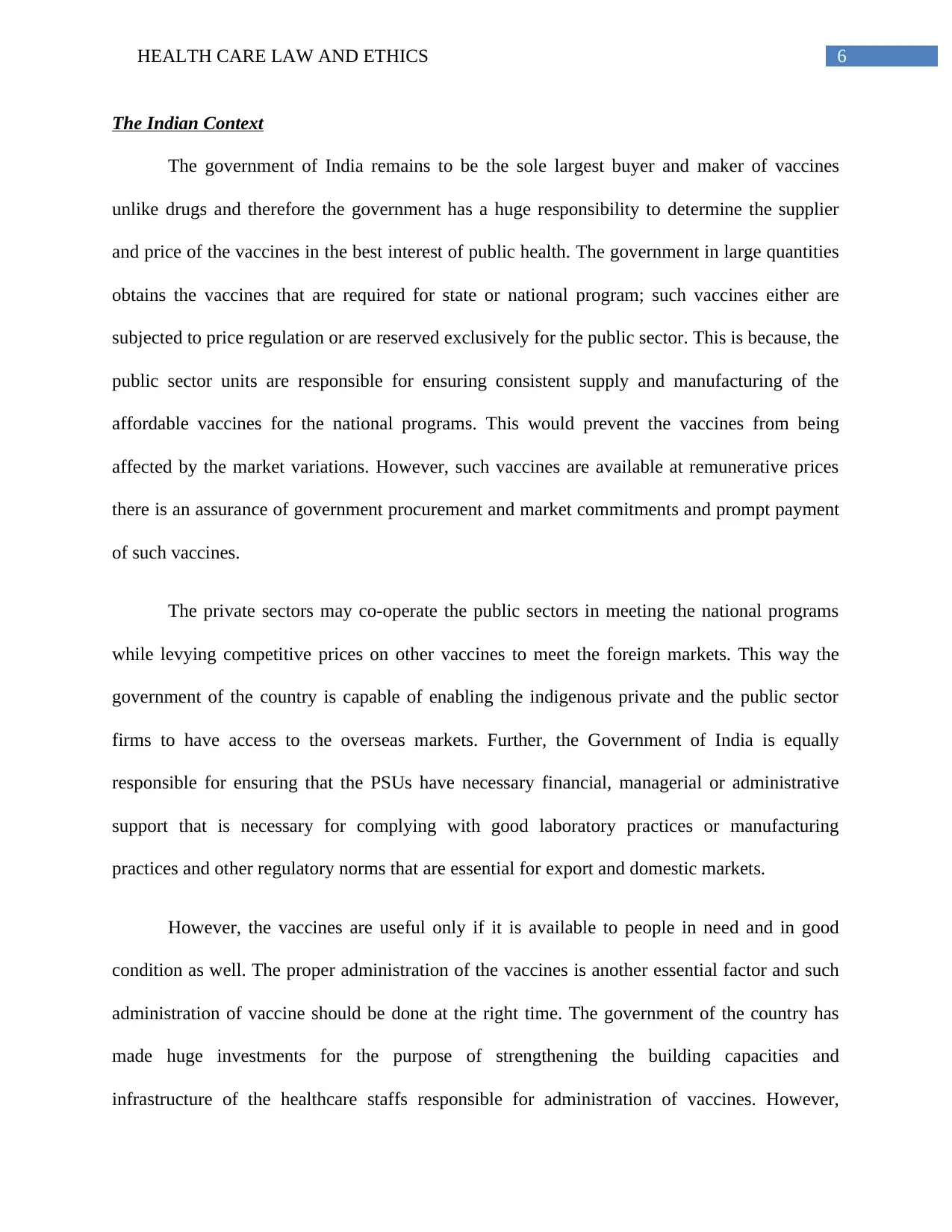
6HEALTH CARE LAW AND ETHICS
The Indian Context
The government of India remains to be the sole largest buyer and maker of vaccines
unlike drugs and therefore the government has a huge responsibility to determine the supplier
and price of the vaccines in the best interest of public health. The government in large quantities
obtains the vaccines that are required for state or national program; such vaccines either are
subjected to price regulation or are reserved exclusively for the public sector. This is because, the
public sector units are responsible for ensuring consistent supply and manufacturing of the
affordable vaccines for the national programs. This would prevent the vaccines from being
affected by the market variations. However, such vaccines are available at remunerative prices
there is an assurance of government procurement and market commitments and prompt payment
of such vaccines.
The private sectors may co-operate the public sectors in meeting the national programs
while levying competitive prices on other vaccines to meet the foreign markets. This way the
government of the country is capable of enabling the indigenous private and the public sector
firms to have access to the overseas markets. Further, the Government of India is equally
responsible for ensuring that the PSUs have necessary financial, managerial or administrative
support that is necessary for complying with good laboratory practices or manufacturing
practices and other regulatory norms that are essential for export and domestic markets.
However, the vaccines are useful only if it is available to people in need and in good
condition as well. The proper administration of the vaccines is another essential factor and such
administration of vaccine should be done at the right time. The government of the country has
made huge investments for the purpose of strengthening the building capacities and
infrastructure of the healthcare staffs responsible for administration of vaccines. However,
The Indian Context
The government of India remains to be the sole largest buyer and maker of vaccines
unlike drugs and therefore the government has a huge responsibility to determine the supplier
and price of the vaccines in the best interest of public health. The government in large quantities
obtains the vaccines that are required for state or national program; such vaccines either are
subjected to price regulation or are reserved exclusively for the public sector. This is because, the
public sector units are responsible for ensuring consistent supply and manufacturing of the
affordable vaccines for the national programs. This would prevent the vaccines from being
affected by the market variations. However, such vaccines are available at remunerative prices
there is an assurance of government procurement and market commitments and prompt payment
of such vaccines.
The private sectors may co-operate the public sectors in meeting the national programs
while levying competitive prices on other vaccines to meet the foreign markets. This way the
government of the country is capable of enabling the indigenous private and the public sector
firms to have access to the overseas markets. Further, the Government of India is equally
responsible for ensuring that the PSUs have necessary financial, managerial or administrative
support that is necessary for complying with good laboratory practices or manufacturing
practices and other regulatory norms that are essential for export and domestic markets.
However, the vaccines are useful only if it is available to people in need and in good
condition as well. The proper administration of the vaccines is another essential factor and such
administration of vaccine should be done at the right time. The government of the country has
made huge investments for the purpose of strengthening the building capacities and
infrastructure of the healthcare staffs responsible for administration of vaccines. However,
Paraphrase This Document
Need a fresh take? Get an instant paraphrase of this document with our AI Paraphraser
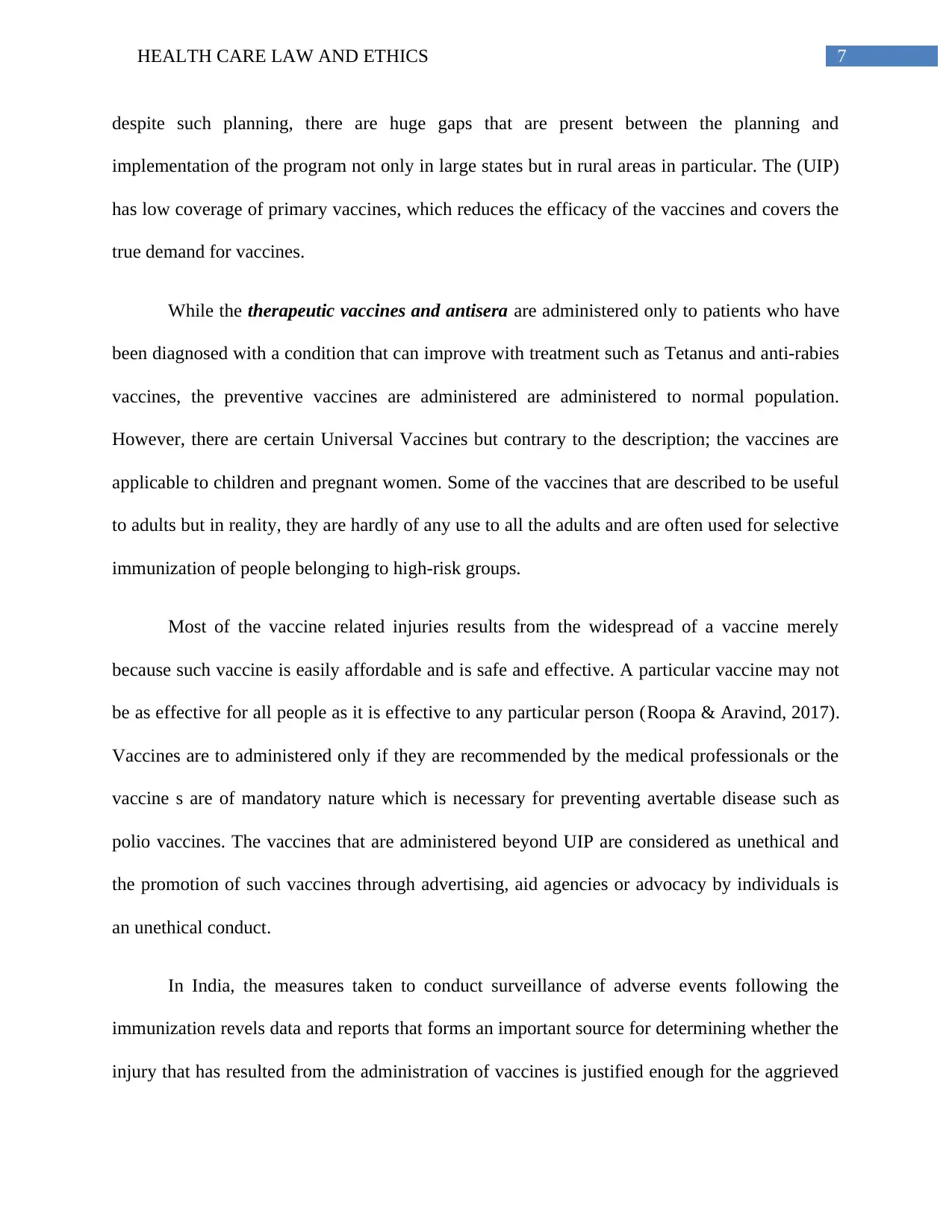
7HEALTH CARE LAW AND ETHICS
despite such planning, there are huge gaps that are present between the planning and
implementation of the program not only in large states but in rural areas in particular. The (UIP)
has low coverage of primary vaccines, which reduces the efficacy of the vaccines and covers the
true demand for vaccines.
While the therapeutic vaccines and antisera are administered only to patients who have
been diagnosed with a condition that can improve with treatment such as Tetanus and anti-rabies
vaccines, the preventive vaccines are administered are administered to normal population.
However, there are certain Universal Vaccines but contrary to the description; the vaccines are
applicable to children and pregnant women. Some of the vaccines that are described to be useful
to adults but in reality, they are hardly of any use to all the adults and are often used for selective
immunization of people belonging to high-risk groups.
Most of the vaccine related injuries results from the widespread of a vaccine merely
because such vaccine is easily affordable and is safe and effective. A particular vaccine may not
be as effective for all people as it is effective to any particular person (Roopa & Aravind, 2017).
Vaccines are to administered only if they are recommended by the medical professionals or the
vaccine s are of mandatory nature which is necessary for preventing avertable disease such as
polio vaccines. The vaccines that are administered beyond UIP are considered as unethical and
the promotion of such vaccines through advertising, aid agencies or advocacy by individuals is
an unethical conduct.
In India, the measures taken to conduct surveillance of adverse events following the
immunization revels data and reports that forms an important source for determining whether the
injury that has resulted from the administration of vaccines is justified enough for the aggrieved
despite such planning, there are huge gaps that are present between the planning and
implementation of the program not only in large states but in rural areas in particular. The (UIP)
has low coverage of primary vaccines, which reduces the efficacy of the vaccines and covers the
true demand for vaccines.
While the therapeutic vaccines and antisera are administered only to patients who have
been diagnosed with a condition that can improve with treatment such as Tetanus and anti-rabies
vaccines, the preventive vaccines are administered are administered to normal population.
However, there are certain Universal Vaccines but contrary to the description; the vaccines are
applicable to children and pregnant women. Some of the vaccines that are described to be useful
to adults but in reality, they are hardly of any use to all the adults and are often used for selective
immunization of people belonging to high-risk groups.
Most of the vaccine related injuries results from the widespread of a vaccine merely
because such vaccine is easily affordable and is safe and effective. A particular vaccine may not
be as effective for all people as it is effective to any particular person (Roopa & Aravind, 2017).
Vaccines are to administered only if they are recommended by the medical professionals or the
vaccine s are of mandatory nature which is necessary for preventing avertable disease such as
polio vaccines. The vaccines that are administered beyond UIP are considered as unethical and
the promotion of such vaccines through advertising, aid agencies or advocacy by individuals is
an unethical conduct.
In India, the measures taken to conduct surveillance of adverse events following the
immunization revels data and reports that forms an important source for determining whether the
injury that has resulted from the administration of vaccines is justified enough for the aggrieved
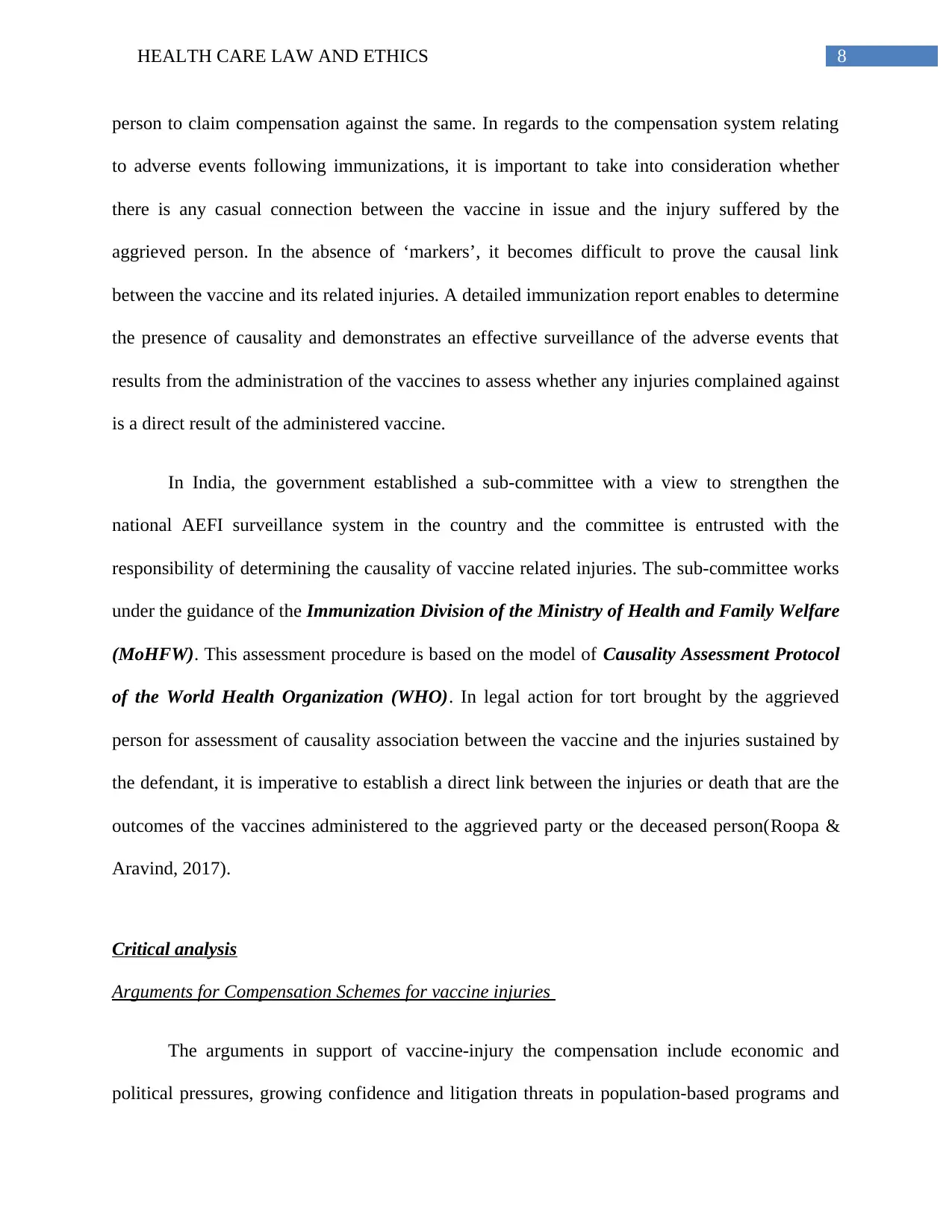
8HEALTH CARE LAW AND ETHICS
person to claim compensation against the same. In regards to the compensation system relating
to adverse events following immunizations, it is important to take into consideration whether
there is any casual connection between the vaccine in issue and the injury suffered by the
aggrieved person. In the absence of ‘markers’, it becomes difficult to prove the causal link
between the vaccine and its related injuries. A detailed immunization report enables to determine
the presence of causality and demonstrates an effective surveillance of the adverse events that
results from the administration of the vaccines to assess whether any injuries complained against
is a direct result of the administered vaccine.
In India, the government established a sub-committee with a view to strengthen the
national AEFI surveillance system in the country and the committee is entrusted with the
responsibility of determining the causality of vaccine related injuries. The sub-committee works
under the guidance of the Immunization Division of the Ministry of Health and Family Welfare
(MoHFW). This assessment procedure is based on the model of Causality Assessment Protocol
of the World Health Organization (WHO). In legal action for tort brought by the aggrieved
person for assessment of causality association between the vaccine and the injuries sustained by
the defendant, it is imperative to establish a direct link between the injuries or death that are the
outcomes of the vaccines administered to the aggrieved party or the deceased person(Roopa &
Aravind, 2017).
Critical analysis
Arguments for Compensation Schemes for vaccine injuries
The arguments in support of vaccine-injury the compensation include economic and
political pressures, growing confidence and litigation threats in population-based programs and
person to claim compensation against the same. In regards to the compensation system relating
to adverse events following immunizations, it is important to take into consideration whether
there is any casual connection between the vaccine in issue and the injury suffered by the
aggrieved person. In the absence of ‘markers’, it becomes difficult to prove the causal link
between the vaccine and its related injuries. A detailed immunization report enables to determine
the presence of causality and demonstrates an effective surveillance of the adverse events that
results from the administration of the vaccines to assess whether any injuries complained against
is a direct result of the administered vaccine.
In India, the government established a sub-committee with a view to strengthen the
national AEFI surveillance system in the country and the committee is entrusted with the
responsibility of determining the causality of vaccine related injuries. The sub-committee works
under the guidance of the Immunization Division of the Ministry of Health and Family Welfare
(MoHFW). This assessment procedure is based on the model of Causality Assessment Protocol
of the World Health Organization (WHO). In legal action for tort brought by the aggrieved
person for assessment of causality association between the vaccine and the injuries sustained by
the defendant, it is imperative to establish a direct link between the injuries or death that are the
outcomes of the vaccines administered to the aggrieved party or the deceased person(Roopa &
Aravind, 2017).
Critical analysis
Arguments for Compensation Schemes for vaccine injuries
The arguments in support of vaccine-injury the compensation include economic and
political pressures, growing confidence and litigation threats in population-based programs and
⊘ This is a preview!⊘
Do you want full access?
Subscribe today to unlock all pages.

Trusted by 1+ million students worldwide
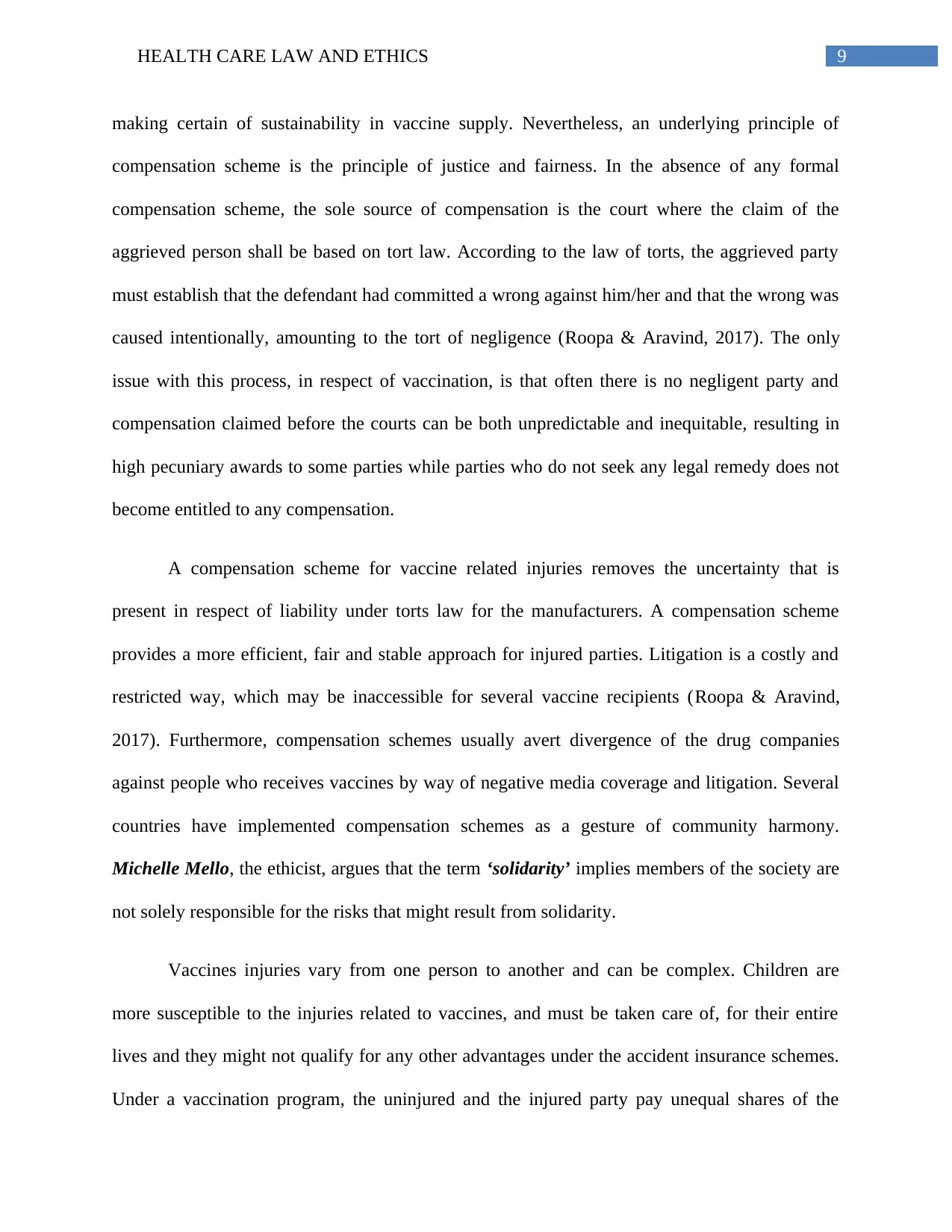
9HEALTH CARE LAW AND ETHICS
making certain of sustainability in vaccine supply. Nevertheless, an underlying principle of
compensation scheme is the principle of justice and fairness. In the absence of any formal
compensation scheme, the sole source of compensation is the court where the claim of the
aggrieved person shall be based on tort law. According to the law of torts, the aggrieved party
must establish that the defendant had committed a wrong against him/her and that the wrong was
caused intentionally, amounting to the tort of negligence (Roopa & Aravind, 2017). The only
issue with this process, in respect of vaccination, is that often there is no negligent party and
compensation claimed before the courts can be both unpredictable and inequitable, resulting in
high pecuniary awards to some parties while parties who do not seek any legal remedy does not
become entitled to any compensation.
A compensation scheme for vaccine related injuries removes the uncertainty that is
present in respect of liability under torts law for the manufacturers. A compensation scheme
provides a more efficient, fair and stable approach for injured parties. Litigation is a costly and
restricted way, which may be inaccessible for several vaccine recipients (Roopa & Aravind,
2017). Furthermore, compensation schemes usually avert divergence of the drug companies
against people who receives vaccines by way of negative media coverage and litigation. Several
countries have implemented compensation schemes as a gesture of community harmony.
Michelle Mello, the ethicist, argues that the term ‘solidarity’ implies members of the society are
not solely responsible for the risks that might result from solidarity.
Vaccines injuries vary from one person to another and can be complex. Children are
more susceptible to the injuries related to vaccines, and must be taken care of, for their entire
lives and they might not qualify for any other advantages under the accident insurance schemes.
Under a vaccination program, the uninjured and the injured party pay unequal shares of the
making certain of sustainability in vaccine supply. Nevertheless, an underlying principle of
compensation scheme is the principle of justice and fairness. In the absence of any formal
compensation scheme, the sole source of compensation is the court where the claim of the
aggrieved person shall be based on tort law. According to the law of torts, the aggrieved party
must establish that the defendant had committed a wrong against him/her and that the wrong was
caused intentionally, amounting to the tort of negligence (Roopa & Aravind, 2017). The only
issue with this process, in respect of vaccination, is that often there is no negligent party and
compensation claimed before the courts can be both unpredictable and inequitable, resulting in
high pecuniary awards to some parties while parties who do not seek any legal remedy does not
become entitled to any compensation.
A compensation scheme for vaccine related injuries removes the uncertainty that is
present in respect of liability under torts law for the manufacturers. A compensation scheme
provides a more efficient, fair and stable approach for injured parties. Litigation is a costly and
restricted way, which may be inaccessible for several vaccine recipients (Roopa & Aravind,
2017). Furthermore, compensation schemes usually avert divergence of the drug companies
against people who receives vaccines by way of negative media coverage and litigation. Several
countries have implemented compensation schemes as a gesture of community harmony.
Michelle Mello, the ethicist, argues that the term ‘solidarity’ implies members of the society are
not solely responsible for the risks that might result from solidarity.
Vaccines injuries vary from one person to another and can be complex. Children are
more susceptible to the injuries related to vaccines, and must be taken care of, for their entire
lives and they might not qualify for any other advantages under the accident insurance schemes.
Under a vaccination program, the uninjured and the injured party pay unequal shares of the
Paraphrase This Document
Need a fresh take? Get an instant paraphrase of this document with our AI Paraphraser
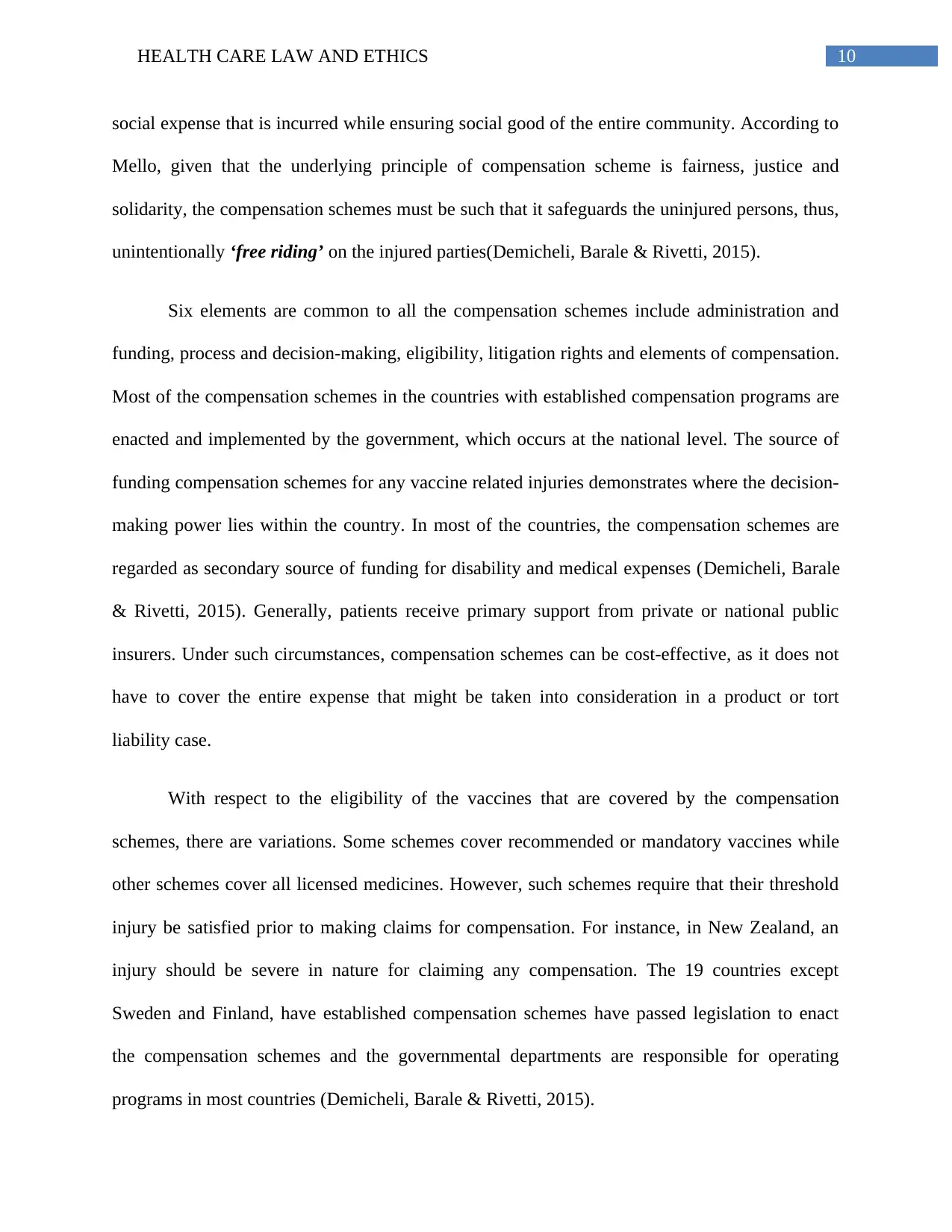
10HEALTH CARE LAW AND ETHICS
social expense that is incurred while ensuring social good of the entire community. According to
Mello, given that the underlying principle of compensation scheme is fairness, justice and
solidarity, the compensation schemes must be such that it safeguards the uninjured persons, thus,
unintentionally ‘free riding’ on the injured parties(Demicheli, Barale & Rivetti, 2015).
Six elements are common to all the compensation schemes include administration and
funding, process and decision-making, eligibility, litigation rights and elements of compensation.
Most of the compensation schemes in the countries with established compensation programs are
enacted and implemented by the government, which occurs at the national level. The source of
funding compensation schemes for any vaccine related injuries demonstrates where the decision-
making power lies within the country. In most of the countries, the compensation schemes are
regarded as secondary source of funding for disability and medical expenses (Demicheli, Barale
& Rivetti, 2015). Generally, patients receive primary support from private or national public
insurers. Under such circumstances, compensation schemes can be cost-effective, as it does not
have to cover the entire expense that might be taken into consideration in a product or tort
liability case.
With respect to the eligibility of the vaccines that are covered by the compensation
schemes, there are variations. Some schemes cover recommended or mandatory vaccines while
other schemes cover all licensed medicines. However, such schemes require that their threshold
injury be satisfied prior to making claims for compensation. For instance, in New Zealand, an
injury should be severe in nature for claiming any compensation. The 19 countries except
Sweden and Finland, have established compensation schemes have passed legislation to enact
the compensation schemes and the governmental departments are responsible for operating
programs in most countries (Demicheli, Barale & Rivetti, 2015).
social expense that is incurred while ensuring social good of the entire community. According to
Mello, given that the underlying principle of compensation scheme is fairness, justice and
solidarity, the compensation schemes must be such that it safeguards the uninjured persons, thus,
unintentionally ‘free riding’ on the injured parties(Demicheli, Barale & Rivetti, 2015).
Six elements are common to all the compensation schemes include administration and
funding, process and decision-making, eligibility, litigation rights and elements of compensation.
Most of the compensation schemes in the countries with established compensation programs are
enacted and implemented by the government, which occurs at the national level. The source of
funding compensation schemes for any vaccine related injuries demonstrates where the decision-
making power lies within the country. In most of the countries, the compensation schemes are
regarded as secondary source of funding for disability and medical expenses (Demicheli, Barale
& Rivetti, 2015). Generally, patients receive primary support from private or national public
insurers. Under such circumstances, compensation schemes can be cost-effective, as it does not
have to cover the entire expense that might be taken into consideration in a product or tort
liability case.
With respect to the eligibility of the vaccines that are covered by the compensation
schemes, there are variations. Some schemes cover recommended or mandatory vaccines while
other schemes cover all licensed medicines. However, such schemes require that their threshold
injury be satisfied prior to making claims for compensation. For instance, in New Zealand, an
injury should be severe in nature for claiming any compensation. The 19 countries except
Sweden and Finland, have established compensation schemes have passed legislation to enact
the compensation schemes and the governmental departments are responsible for operating
programs in most countries (Demicheli, Barale & Rivetti, 2015).
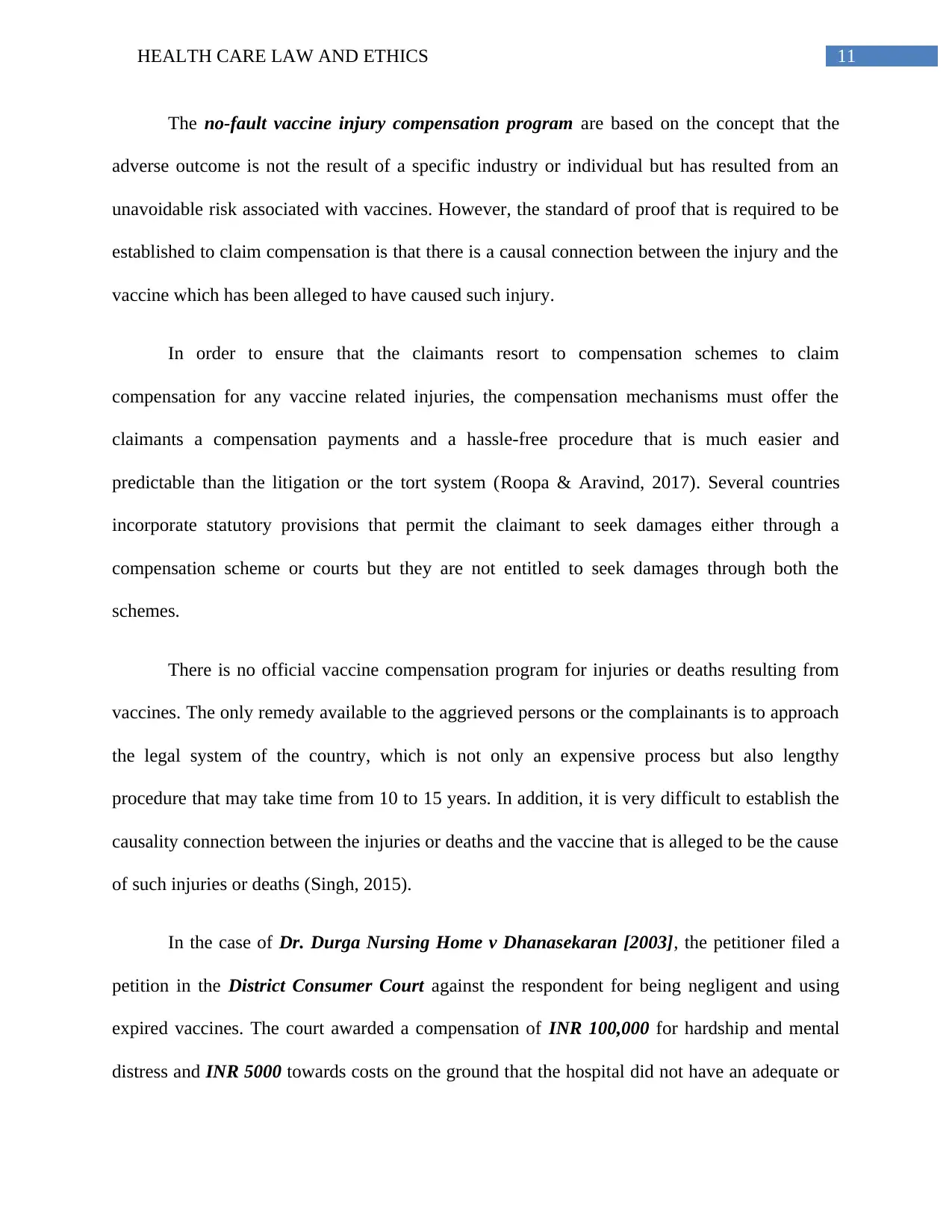
11HEALTH CARE LAW AND ETHICS
The no-fault vaccine injury compensation program are based on the concept that the
adverse outcome is not the result of a specific industry or individual but has resulted from an
unavoidable risk associated with vaccines. However, the standard of proof that is required to be
established to claim compensation is that there is a causal connection between the injury and the
vaccine which has been alleged to have caused such injury.
In order to ensure that the claimants resort to compensation schemes to claim
compensation for any vaccine related injuries, the compensation mechanisms must offer the
claimants a compensation payments and a hassle-free procedure that is much easier and
predictable than the litigation or the tort system (Roopa & Aravind, 2017). Several countries
incorporate statutory provisions that permit the claimant to seek damages either through a
compensation scheme or courts but they are not entitled to seek damages through both the
schemes.
There is no official vaccine compensation program for injuries or deaths resulting from
vaccines. The only remedy available to the aggrieved persons or the complainants is to approach
the legal system of the country, which is not only an expensive process but also lengthy
procedure that may take time from 10 to 15 years. In addition, it is very difficult to establish the
causality connection between the injuries or deaths and the vaccine that is alleged to be the cause
of such injuries or deaths (Singh, 2015).
In the case of Dr. Durga Nursing Home v Dhanasekaran [2003], the petitioner filed a
petition in the District Consumer Court against the respondent for being negligent and using
expired vaccines. The court awarded a compensation of INR 100,000 for hardship and mental
distress and INR 5000 towards costs on the ground that the hospital did not have an adequate or
The no-fault vaccine injury compensation program are based on the concept that the
adverse outcome is not the result of a specific industry or individual but has resulted from an
unavoidable risk associated with vaccines. However, the standard of proof that is required to be
established to claim compensation is that there is a causal connection between the injury and the
vaccine which has been alleged to have caused such injury.
In order to ensure that the claimants resort to compensation schemes to claim
compensation for any vaccine related injuries, the compensation mechanisms must offer the
claimants a compensation payments and a hassle-free procedure that is much easier and
predictable than the litigation or the tort system (Roopa & Aravind, 2017). Several countries
incorporate statutory provisions that permit the claimant to seek damages either through a
compensation scheme or courts but they are not entitled to seek damages through both the
schemes.
There is no official vaccine compensation program for injuries or deaths resulting from
vaccines. The only remedy available to the aggrieved persons or the complainants is to approach
the legal system of the country, which is not only an expensive process but also lengthy
procedure that may take time from 10 to 15 years. In addition, it is very difficult to establish the
causality connection between the injuries or deaths and the vaccine that is alleged to be the cause
of such injuries or deaths (Singh, 2015).
In the case of Dr. Durga Nursing Home v Dhanasekaran [2003], the petitioner filed a
petition in the District Consumer Court against the respondent for being negligent and using
expired vaccines. The court awarded a compensation of INR 100,000 for hardship and mental
distress and INR 5000 towards costs on the ground that the hospital did not have an adequate or
⊘ This is a preview!⊘
Do you want full access?
Subscribe today to unlock all pages.

Trusted by 1+ million students worldwide
1 out of 26
Your All-in-One AI-Powered Toolkit for Academic Success.
+13062052269
info@desklib.com
Available 24*7 on WhatsApp / Email
![[object Object]](/_next/static/media/star-bottom.7253800d.svg)
Unlock your academic potential
Copyright © 2020–2026 A2Z Services. All Rights Reserved. Developed and managed by ZUCOL.
